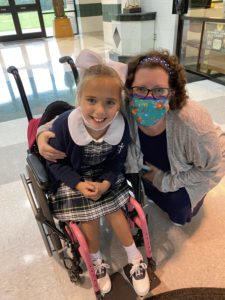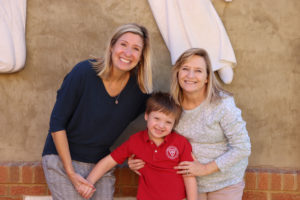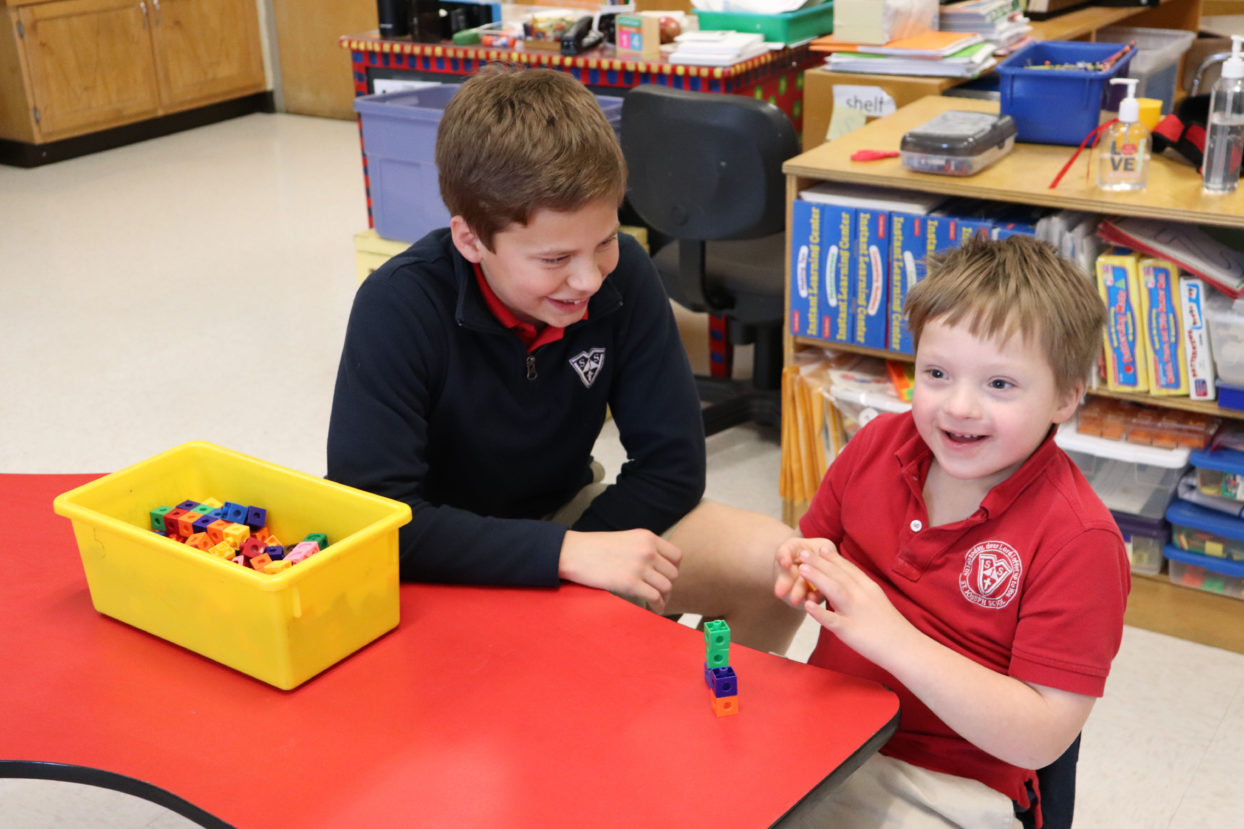Diocese of Knoxville educators accommodate children with a wide range of learning needs
By Gabrielle Nolan
The Diocese of Knoxville has been serving students with special learning needs for more than 20 years.
The Office of Catholic Schools’ Special Services Handbook, which is revised every five years, is “a living document and a living practice of doing accommodations,” said Dr. Sedonna Prater, superintendent of Catholic schools for the Diocese of Knoxville.
“We’ve had huge successes with meeting the learning needs of all of our students,” Dr. Prater said.
“We’re going to do the very best that we can to serve all of the children,” she added. “But having said that, we want to do it with justice, so we’re going to be very honest and truthful in what we can reasonably do and what families can expect.”

St. John Neumann second-grader Caroline Ayres poses for a picture with learning lab coordinator Michelle Dougherty.
Currently, most Diocese of Knoxville schools do not have students who are severely handicapped, but there is a wide range of special needs, including Down syndrome, autism, cerebral palsy, and learning disabilities.
Each Catholic school has a different capacity in accommodating children with special needs, as resources and school infrastructures vary across the diocese.
“Our facilities, most of them were built pre-1960, and so they’re not necessarily ADA-compliant,” Dr. Prater said.
St. John Neumann School in Farragut, built in 1997, has accessible doors and bathroom facilities that comply with the federal Americans With Disabilities Act, the 1990 civil rights law that prohibits discrimination based on disability.
“We don’t have stairs, we don’t have a basement, we don’t have a second floor. We’re a one-floor facility,” said Michelle Dougherty, coordinator of the learning lab at St. John Neumann School. “That makes us accessible, especially to students who have mobility issues.”
One such student is Caroline Ayres, a second-grader at St. John Neumann. Caroline has cerebral palsy and uses a wheelchair to move about in her classes.
“Some might assume that because Caroline has cerebral palsy, meeting her needs would be a daunting task,” said Sabrina Talley, academic dean at St. John Neumann. “However, we’ve discovered quite the opposite. Our school community is stronger because of Caroline.”
“Her lively spirit and sense of joy permeate throughout the building on a daily basis,” Mrs. Talley continued.
In addition to its accommodating physical needs, the school also strives to cater to students with varying intellectual needs.
Most people are unaware that about 30 percent of students currently enrolled in local Catholic schools have some type of individualized support learning plan, Dr. Prater said.
At St. John Neumann School, around 42 children have an official disability diagnosis out of an enrollment population of more than 400 students.
“That can range anything from ADHD, autism spectrum disorder, specific learning disabilities in reading, writing, and math,” Ms. Dougherty said. “We just kind of run the gamut.”
Two years ago, St. Joseph School in North Knoxville enrolled its first student with Down syndrome.
After a negative experience of public preschool for her son, Joseph, Misty Weber called the Catholic school to see if it could potentially work out a plan.
“We wanted him to be with our people, people who valued his life as much as we did,” Mrs. Weber said.
After a meeting involving the school’s principal, a learning specialist, and pre-kindergarten teachers, a decision was made to enroll Joseph at the school.
He was enrolled part-time in pre-K for the first year, going two days a week, and then transitioned to full-time the second year. This school year, Joseph is in kindergarten.
“The thing that I could not provide for him that they really do is a sense of order,” Mrs. Weber explained. “Like, I know when he was in pre-K, every 15 minutes they had a new thing that they were doing. I cannot pull that off at home.”
The inclusivity of Catholic schools allows students with special needs or learning disabilities to remain in the same classrooms with their peers.
“They do everything that our students do; we don’t hold any testing out. For example, if the school is doing standardized testing, the students are going to take standardized testing along with all of the students,” Dr. Prater said.
“The curriculum is diocesan curriculum created by teachers,” she added. “We do accommodations and modifications based on the child.”
Dr. Prater also mentioned that money from Title 1, the Elementary and Secondary Education Act, can be used to support students with learning needs and pay for interventionists.
“An interventionist is somebody who works with students who need support in the classroom, whether it is academic issues or delays,” said Ms. Dougherty.
“Or, even on the other realm of the spectrum, if they need more of a challenge, if they need enrichment opportunities,” she added. “Mostly, I work with students who are working toward grade level.”
“It is just so fun to see when they have that light-bulb moment, or when things start to click with them, and you can see the progress. You can see how proud they are of the progress or the milestones that they have reached,” Ms. Dougherty said.
If a family with a special-needs child wants to hire and pay for an instructional assistant, the school will interview the individual and ensure they meet the child-safety requirements and a background check.

Joseph Weber stands with St. Joseph School pre-K teacher Sarah Daddabbo (left) and kindergarten teacher Bridget Cannon.
Adults aren’t the only ones to help, however. Classmates and other students often pitch in to assist their peers.
“The kids are helping [Joseph], too,” explained St. Joseph kindergarten teacher Bridget Cannon. “No Joseph… you cut that wrong or you used the wrong color—here, let me show you what you need to do. The children are doing that as well.”
In addition, 20 middle-school honors students were trained at St. Joseph School to work one-on-one with Joseph for 30-minute increments during the day to assist him in his class.
“These are tremendous young people! They adore my son and are learning life skills about helping and serving,” Mrs. Weber said.
“I just enjoy being around him,” said St. Joseph eighth-grader Chase Tucker. “He’s always in a great mood, and he’s just amazing to be around, and he’s just a great person. Every time I see him… that’s probably my favorite part of the day.”
Adjusted curriculum plans for special-needs children who are below grade level allow students to remain with their age group and friends instead of being retained.
“In my job capacity, I get the opportunity to work one-on-one or in small groups with students, and I get to follow some of the students who I started working with in kindergarten, depending on if they still need support,” Ms. Dougherty said.
“I think what is most meaningful to me is to see kids who are reluctant learners sometimes, or misunderstood learners, who start to like school,” she added.
In a written testimony in 2020 to St. John Neumann School, Caroline’s mother, Amy Ayres, wrote that “in just a few short months, we have seen Caroline flourish. There is no denying that full acceptance and inclusion changes the spirit!”
“Caroline’s growth academically, socially, and emotionally has brought us such great encouragement. And most importantly, what she is learning and experiencing regarding the Catholic faith is irreplaceable!” Mrs. Ayres continued. “Everyone involved has blown us away in their openness, hospitality, accommodations, and amazing kindness that has been shown to our Caroline and us, as her family.”
Similarly, Mrs. Weber has given accolades for the difference that St. Joseph School has made in her son’s life.
“I am so grateful for the staff and family at St. Joseph School,” Mrs. Weber said. “It is a true testament to the Catholic faith and culture.”
“I think the main thing that St. Joseph School has done for my son, outside of the whole acceptance part, is they’ve expected good things from him, and they’ve expected him to do hard things,” she shared.
“And that’s what we need for kids who have special needs. We can’t just put them in the back of the room and hope for the best. We call them forward, and that’s what they’ve done,” Mrs. Weber continued. “The more they call him up, the more he’s going to be able to do to reach his potential.”
The Catholic Church has long called for inclusion within its school systems, as it is part of the mission to educate and serve all children, Dr. Prater explained.
“My message is that we want to work with you, our families, to educationally serve your children,” Dr. Prater said.
For parents interested in potentially enrolling their special-needs child in a Diocese of Knoxville school, the schools first meet with the family and child for an assessment to see if they are the best educational option to support these students.
“I would say definitely come and check us out,” Ms. Dougherty said. “Yes, it’s true we don’t have all the related services that the public schools can offer, but we have a lot more than you think, and the fact that we try to include students in our school, I think that gives them a sense of community and family and belonging, and so definitely come and check us out for those reasons.”
“Just reach out to your local Catholic schools and see what they’ll do, because inclusion in Catholic education is a movement,” she added. “And it’s not just something that’s happening here in Knoxville; it’s happening all across the United States.”
Reporter’s note: Enrollment of special-needs students is evaluated on a case-by-case basis and varies among each Catholic school. Student evaluations do not guarantee admission.


Comments 2
I praise and thank our God for your great works with all these children. I applaud your wonderful efforts to include special needs students and strive to include fellow students in awareness and care for the children who need to be included.
You are such a blessing to these families and to our community. I’m so very grateful.
I can say good things about St. Joseph School & Knoxville Catholic High School. St. John Neumann, not so much. It’s pretty hypocritical to say and mention that you make accomodations at St. John Neumann, but don’t have your staff fully informed and knowledgeable in that area, especially within the hiring staff. After going to Catholic Schools pretty much all of my educational life, I am grateful. However, I am extremely disappointed in St. John Neumann School on how an employee was treated with a disability after St. John Neumann found out about the disability. Then, after the incident, that employee was shushed about the incident. Don’t mention it if you can’t back up.